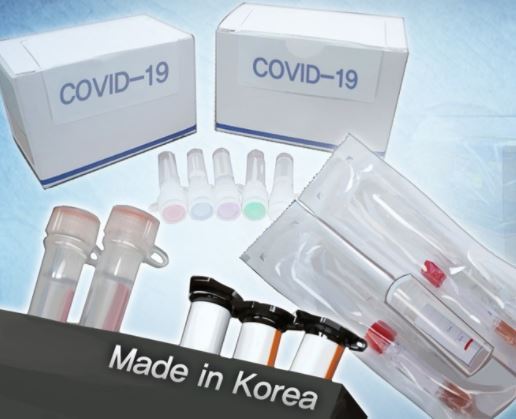 |
Exports of Korean COVID-19 diagnostic reagents raked in 2.5 trillion won ($2.3 billion) by end-November. (Yonhap) |
South Korea has a new export item. COVID-19 diagnostic reagents notched a 2.5 trillion won ($2.3 billion) performance up to end-November.
Diagnostic reagents are among the most fundamental components of diagnostic testing assays. Simply put, it is critical to have a well-functioning reagent to accurately discern a COVID-19 infection.
According to the Ministry of Food and Drug Safety and the Korea Customs Service on Friday, Korea had exported enough COVID-19 diagnostic reagents to cover 496.8 million people across 170 nations by end-November this year.
The number of nations seeking to import Korean diagnostic reagent products has increased incrementally since March.
India, Germany, the Netherlands, Italy and the US combined accounted for more than 50 percent of all COVID-19 diagnostic reagent exports. India accounted for 15.6 percent, Germany 13.2 percent, the Netherlands 9.6 percent, Italy 7.8 percent and the US 5.2 percent.
This is a new category of exports for Korea, and proof that the nation’s successful pandemic containment efforts are being reflected in global demand, the Drug Ministry declared.
Further boosting the industrywide morale, on Wednesday Korea’s infectious disease diagnostics procedure was adopted as the international standard, now known as ISO 17822 or “In vitro diagnostic test systems -- Nucleic acid amplification-based examination procedures for detection and identification of microbial pathogens -- Laboratory quality practice guide.”
Currently, 221 COVID-19 diagnostic reagents are approved for export from Korea. Of those, DNA diagnostic reagents accounted for 105, antigen reagents 44 and antibody reagents 72.
DNA diagnostic assays, also referred to as real-time polymerase chain reaction tests and molecular diagnostics, have the upper hand in accuracy.
Antigen and antibody reagents, while they produce faster test results, are only effective if the infection has progressed somewhat. This is because the tests determine whether the body has formed antigens or antibodies against the intruding virus. Accuracy is limited in the very early phases of infection.
For domestic use, Korea currently has enough diagnostic reagents to test 830,000 people. Considering the country tests an average of 20,000 people per day, the secured stock is sufficient to last over a month, the authorities said.
The daily maximum output of COVID-19 diagnostic reagents for domestic use is enough for 590,000 people. So far, Korea has conducted more than 3.13 million tests. The nation’s population is roughly 51 million.
By Lim Jeong-yeo (
kaylalim@heraldcorp.com)








